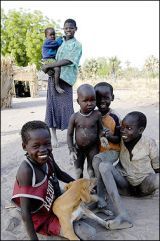UN to provide basic infrastructure for refugees returning to S. Sudan
GENEVA, Feb 22, 2005 (AP) — The U.N. refugee agency said Tuesday that it is sending an emergency team to southern Sudan to help 560,000 people rebuild their lives when they return to the country after a two-decade conflict.

|
|
A group are Sudenese children play outside their makeshift hut on the outskirts of the southern Sudan provisions town of Rumbek.(AFP). |
Refugees in seven neighboring nations are expected to go home to Sudan after the country’s government and the main southern rebel group signed a comprehensive peace deal Jan. 9 to end their 21-year war.
However, said Ron Redmond, spokesman for the U.N. high commissioner for refugees, many exiles “have told us they are reluctant to return to a region almost totally lacking in infrastructure and basic services after more than two decades of conflict.”
The 15-member UNHCR team will expand and build new school and sanitation facilities, as well as repair roads and water supplies, Redmond said. The team will also help educate people about HIV/AIDS and the danger of land mines.
The first return of refugees could start after the rainy season ends in October, provided there is enough investment now to rebuild the area, Redmond explained.
UNHCR urgently needs about US$62 million (A?47 million) to do the job, Redmond said.
So far, the UNHCR has not yet received any donations from governments. The deployment and work of the emergency team is being funded from the agency’s reserves, said Redmond.
Up to 4 million more people who fled southern Sudan stayed in their homeland rather than heading across the border. Some of them are also starting to southern Sudan, but UNHCR has not estimated the numbers.
The 560,000 refugees are in Central African Republic, Congo, Egypt, Eritrea, Ethiopia, Kenya and Uganda. UNHCR has not said how long it expects the repatriation to take.
The southern civil war pitted the Arab Muslim-dominated government in Khartoum against rebels fighting for greater autonomy and a larger share of the country’s wealth in the largely African animist and Christian south.
More than 2 million people died during the conflict, mainly from war-induced famine and disease.
